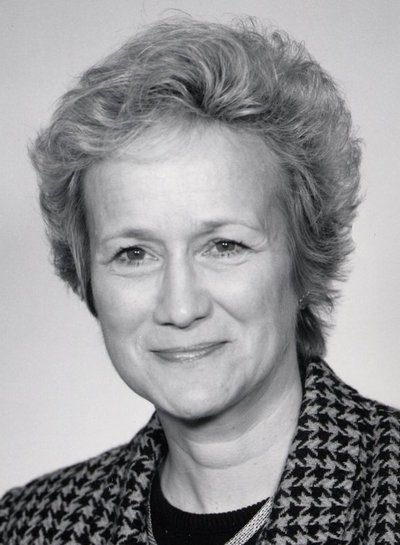June 1, 2006
Bloedel professorship goes to Frances Lewis
Dr. Frances Marcus Lewis has made an international reputation for herself applying rigorous scientific methods for a compassionate purpose: helping women, couples and families affected by breast cancer.
She has recently been awarded one of the UW’s new five-year Virginia and Prentice Bloedel professorships to support her continuing work.
“The purpose of the Bloedel professorships,” Provost Phyllis Wise says, “is to assist the UW to retain and attract outstanding scholars and teachers. We are further directing these professorships toward enhancing our ability to recruit and retain the finest faculty who are concentrating on interdisciplinary research and teaching.”
“What I most want to do in the next five to 10 years,” Lewis says, “is to move evidence-based programs and services for families impacted by cancer from research into regular clinical practice in health-care systems and institutions. Someday, I hope there will be a time when nobody would think of providing physical care without providing support for a patient’s family, children and other relationships
“For example, we know from our work that marriages, even very good marriages, are stressed by a diagnosis of breast cancer. This tension is part of the natural history of the illness. We expect it to happen but our interventions help to prevent its intensity and duration. Based on our team’s research, we know how to help, and we have tested our interventions,” she says.
“It is one thing to do the science and generate evidence-based guidelines; it is still another to integrate the science into everyday practice. With the Bloedel professorship, I hope to expand our ongoing collaborative research with colleagues in medicine, public health, public policy, psychology, nursing and social work,” she says. “Together, we can develop and test models of family-focused care that are practical and efficient in both the hospital and outpatient setting. We have already started this important collaborative work; the Bloedel professorship will enable us to move it forward even more.”
Lewis, who joined the School of Nursing faculty in 1978, is now the Elizabeth Sterling Soule professor of health promotion and nursing in the Department of Family and Child Nursing. She began her career as a nurse, and then came to the UW to earn a master’s degree in nursing. In 1977 she received a Ph.D. in the sociology of education from Stanford.
These days, her life is a whirlwind of research studies, meetings, speaking engagements and international work, including in Ukraine, where she served as one of the four lead technical consultants on a U.S. Agency for International Development grant funded through the Seattle-based organization PATH. She is interested now in developing the work there to include UW students.
Dr. Connie Lehman, UW associate professor of radiology, has worked with Lewis both in the Ukraine and here at home. She comments: “Fran Lewis brings a unique energy and passion to her work. She attacks every project, every challenge with unparalleled determination. When I think, at the end of our lives, how will we assess what we did with the time and the talents we were given, I do know the answer for Fran Lewis: She did everything in her power to make the world a better place.
“Several physicians and scientists at UW Medical Center and our community agreed to assist in a project to improve breast cancer detection and treatment in Ukraine,” Lehman continues. “Fran not only agreed, she actually learned Russian so she could talk to our new colleagues and patients in their own language. Talk to, and listen. I watched how Fran made sure that every woman she met during her work in Ukraine knew that she was listening to them, really listening. Driven, absolutely, but she is also a woman who moves through the world with enthusiastic joy and kindness. She is a treasure we are lucky to have at the UW.”
Although her work is based in compassion and the desire to make things easier for people with chronic, life-threatening illness, Lewis is known as a careful and methodical scientist who makes the effort to thoroughly test interventions that might be useful.
“We absolutely need to know what works and what doesn’t work, and we need to be able to quantify the costs and the resources needed to provide a certain kind of service and program,” she says.
Much of her recent effort has been in developing and then testing specific educational counseling programs for families in which the mother has been diagnosed with breast cancer. Along with stress for the marriage, the needs and fears of children are a concern. Children worry about their mother dying from the cancer and mothers worry about the effects of the disease on their families, Lewis says.
Lewis is a noted research methodologist and is trained to rigorously measure patient and family-member behavior, adjustment and outcomes. This work has included developing new ways to measure a child’s response to a mother’s or father’s cancer, new ways to assess marital quality and adjustment to cancer, and new ways to study how family members manage the impact of cancer on their everyday lives.
Dr. Julie Gralow, associate professor of medicine and a physician at the Seattle Cancer Care Alliance, who is also active in several community groups for women with breast cancer, says about her: “Dr. Lewis’s research has given us important insight into the effect of a breast cancer diagnosis on the entire family. Her work has given us an increased understanding of the profound and far-reaching impact of a breast cancer diagnosis and/or recurrence, and has led to the development of effective tools that can be implemented to help facilitate family communication and coping skills. We look forward to continuing our collaboration with Dr. Lewis and her research team as we strive to provide support for our breast cancer patients and their families during a frightening and confusing time.”

